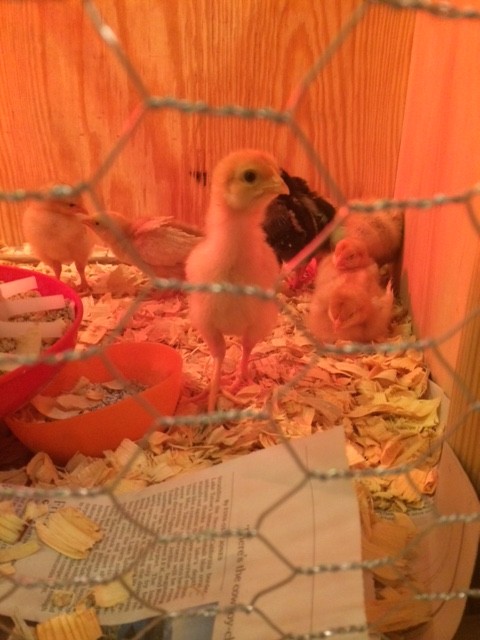 He had me at “you’ll never taste a better egg in your life.”
He had me at “you’ll never taste a better egg in your life.”
My boss was lauding the merits of his wife’s chicken-rearing adventures. Granted, they lived in the English hillside, but it was his emphasis on how amazing the eggs were that got me. If there was an amazing egg to be had – a still warm egg dropped straight from the chicken – I wanted to try it.
Of course, the simpler option might be to ask the guys down at Findlay which eggs were fresh from that morning, but nah. Let’s have an adventure. Heck with farm to table… we’re going backyard to belly!
That was about a year ago. Now, we have six Red Star hens who produce approximately five to seven gorgeous brown eggs a day. They have awesome names like Henny Penny, Sammi Spots, Chickaletta, Red, Brick and Flag (coming at you straight from the mind of a four-year-old).

But my boss was right – there’s something amazing about a fresh egg. I don’t know if it’s the work we’ve put into it, the fact that the chickens can forage for whatever bugs and plants they want or that it’s just a darn good egg. But it’s been a great experience for us. And from what I’ve heard from our local farm store where we purchase the chicken feed, it’s something a lot more local families are trying.
So, six reasons why you might also want to consider raising chickens in your backyard:
- You always have eggs. Last month, the Washington Post reported an egg shortage from the bird flu, which resulted in the death of more than 20,000 chickens in May 2015 alone. With your own chickens, you can determine the number of eggs you want each day based on the number of hens (the egg-laying girl chickens). Hens will lay fewer eggs during the winter and extremely hot temperatures, but you will still get eggs.
- Chickens make great pets. Depending on the breed, most hens can be wonderful around children and offer great entertainment for the family. Like dogs and cats, we’re finding that many of our girls have their own little personalities.

She likes offering the hens “treats” of leaves pulled from the trees. For example, Chickaletta loves adventure and refuses to go back into the hen house at night. Check out this awesomeness my cousin sent of a rooster booting a soccer ball around.
- Raising chickens offers a great learning opportunity for children. In addition to learning responsibility in helping care for a pet, kids can gain a lot from learning how to develop their own food. My girls love going out to the coop each morning to gather the eggs they will eat for breakfast.
- Free range eggs are better for you. This article from the San Francisco Chronicle cites several specific studies highlighting the dietary benefits of free range eggs, but in short, chickens with access to bugs, grass and leaves will lay eggs with less fat and cholesterol and more Vitamin A, Vitamin E and Omega-3 Fatty Acids (heart health) than grain fed chicks raised in a cage.
- They offer some of the best natural fertilizer in town. With an extremely high nitrogen and phosphorous content, poultry manure is smart choice for garden and grass fertilization without chemicals. From chicken manure “tea” to applying manure before the off-season, here’s some info from HGTV on how you can reuse chicken poop to grow other foods. I haven’t gotten this adventurous yet, but it’s an option.
- They help control insects. We live in a wooded area, so you’d think we’d be picking ticks off the girls daily. The chickens have done a great job of controlling the ticks, beetles and some of the other annoying pests that eat holes through our plants. (I was hoping they’d eat stink bugs, but everything I’ve read says no such luck.)
So with the good comes some bad. If not, everyone would do it. So here’s the low-down on a few of the cons we’ve found to raising chickens:
- There’s no “doggy daycare” for chickens. Chickens do require daily attendance. You need to put them in the [chicken] house at night so they’re safe from predators, feed them, water them and collect their eggs. If you don’t have someone who can assist with those activities, it can be tough to leave town for an extended period of time.
- They are dirty. You can get salmonella from just touching chickens – or anything that chickens have touched, so handwashing is critical. Like any other animal, you need to regularly clean out their space to make sure the bedding is fresh and it doesn’t offer a breeding ground for bacteria – particularly in humid summer months. I typically clean out their coop once every other week, replacing all the straw to keep it from getting gross.
- It’s an investment. It can be years before your chickens pay off what you put into their brooder (where you put them when they’re babies), coop and run. There are thousands of options for the coop based on what fits best with your yard, the architecture of your home and the zoning requirements of your area, but you can easily spend anywhere from $250 – $1000 on getting the coop, run (where they hang out during the day if you don’t want to free range them), water and feed containers set up.
- It can be tough to get rid of chickens once you make the commitment. If you’re not comfortable “just twisting their necks” as my mother breezily suggested (disclaimer, my grandfather was a bird doctor), chickens can be tough to get rid of. Chickens have a “pecking order” and introducing a new hen to a flock can be tough – so many people avoid it.
Random Things You Should Know:
- Both Ohio and Kentucky have laws requiring you purchase a minimum of six one-day old chicks at a time from a feed store. This is to keep people from buying “pet” chickens at Easter.
- In addition to feed and bedding, chickens also require grit to maintain their digestive health and oyster shells (or other eggs) to harden their eggs.
- Many young chickens start laying eggs around the 4-5 month mark (15-20 weeks), which is why agriculture and feed stores start selling them in late February (so they start producing by late June/early July). You can start your flock anytime, but know that they’ll slow production during the cold months of winter.
- Chickens have a lot of natural predators. Like many humans, dogs, hawks, owls, coyotes, raccoons and even snakes all love a good chicken dinner, so it’s critical to build a secure space for them to live.
- I know about 5 percent of all there is to know about chickens, so PLEASE do your own research before committing to a flock.
Great resources:
Blog: http://www.backyardchickens.com/ – This was our go-to site when designing the coop, learning about nuances of certain species and most recently, figuring out when our girls were going to start laying.
Books:
Storey’s Guide to Raising Chickens
Fresh Eggs Daily: Raising Happy, Healthy Chickens Naturally
Magazine:















Thanks for sharing these basic tips for those interested in possibly raising backyard poultry, however, hens who lay very well (like your Golden Comets) produce one egg every 26-28 hours, so if you have six hens, you cannot get seven eggs in one day. Seven yolks, though, is totally possible!
Know of any places to give up chickens? I have a friend who has a chicken that is not producing eggs and wants to get rid of her. Trying to find her a good home instead of the not so pleasant alternative….
(She is a beautiful white hen!)
Maybe give Gorman Heritage Farm a call.